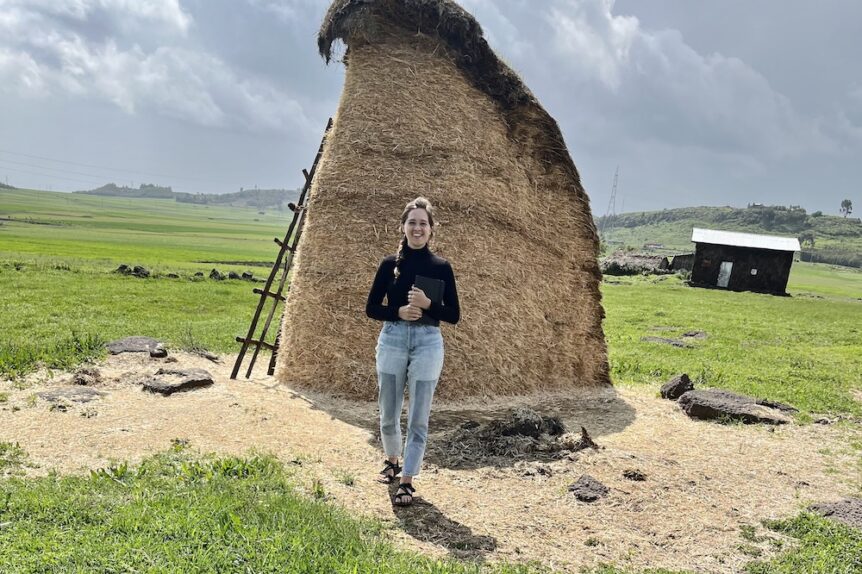Above: Natalie Volin, 11th Class Leland Fellow.
Over the past year at the International Food Policy Research Institute (IFPRI), I have worked on the evaluation and learning activities of the Strengthen Productive Safety Net Program Institutions and Resilience Development Food Security Activity, or SPIR, a “graduation model” social protection project in Ethiopia. Graduation refers to the goal of graduating from poverty. These programs take a multifaceted approach to target many aspects of the enabling environment, or the conditions that contribute to household food security. By simultaneously addressing challenges faced by the poor, a multisectoral program has the potential to push households out of poverty into a more stable state.
This integrated approach is thought to be a more sustainable way to decrease poverty rates, though it requires a substantial investment. SPIR, funded by USAID, does just that. In addition to basic programming required by the government’s social safety net program, SPIR implements multisectoral interventions that address mental health issues, empower women, engage men in household nutrition, train youth in employable skills, and strengthen local markets and the broader food environment.
Each of these interventions has the potential to impact a household’s food security, directly or indirectly. For example, mental health is not the first thing that comes to mind when considering how to improve household food security in low-resource communities, yet low psychological well-being and poverty are mutually reinforcing. Poverty can lead to stress and anxiety, and poor mental health can limit an individual’s ability to participate in the labor market.1 Further, maternal depression has been linked to child malnutrition and household food insecurity.23
Likewise, there is evidence that engaged husbands and fathers can improve maternal and child health and nutrition outcomes.4 Fathers’ support and knowledge of infant feeding is associated with maternal dietary diversity and adherence to optimal child nutrition practices. Through SPIR, community-level men’s groups were formed to discuss topics such as gender norms and men’s role in caregiving and household chores.
Another intervention, again indirectly related to nutrition, is the provision of cash transfers. The strong evidence base for cash transfers demonstrates households are much more likely to take up the practices promoted through livelihood and nutrition interventions if they are financially supported.5 Direct cash transfers empower individuals and enable them to use the money how they see fit, whether it be towards improving dietary diversity, investment in a livelihood activity, or towards their child’s education.
But while evidence supports graduation model programs in other contexts, these interventions have not been validated in Ethiopia. As the learning and evaluation partner, IFPRI is tasked at designing randomized controlled trials to assess the impact of these interventions.
Part of my role at IFPRI has been to support these research activities. For example, work on the mental health program has involved developing surveys to measure depression and household characteristics before and after a mental health intervention. I work with a local survey firm to finetune survey questions so that they capture the information needed to determine whether the program has had a positive impact on their mental health status. These surveys measure changes in mental health, but also capture the impact the program might have on household consumption, food security, and resilience to shocks.
As a Hunger Fellow, one might expect my work to revolve around food and nutrition research, but hunger is multidimensional and requires an approach that considers the entire enabling environment. Food security is commonly broken down into four pillars of availability, access, utilization, and stability, yet these pillars could be exponentially expanded to capture all the contributing factors to hunger and food security.
My work at IFPRI varies widely, from analyzing data on agricultural innovation adoption, to literature reviews on barriers to proper complementary feeding practices, to evaluating the cost-effectiveness of the entire suite of interventions. While my work has not always been directly related to food and nutrition outcomes, these activities contribute to understanding the enabling environment and the factors that impact the people we aim to serve.
- Chemin, M., De Laat, J. and Haushofer, J., 2013. Negative rainfall shocks increase levels of the stress hormone cortisol among poor farmers in Kenya. Available at SSRN 2294171. [↩]
- Haithar, S., Kuria, M.W., Sheikh, A., Kumar, M. and Vander Stoep, A., 2018. Maternal depression and child severe acute malnutrition: a case-control study from Kenya. BMC pediatrics, 18(1), pp.1-9. [↩]
- Herba, C.M., Glover, V., Ramchandani, P.G. and Rondon, M.B., 2016. Maternal depression and mental health in early childhood: an examination of underlying mechanisms in low-income and middle-income countries. The Lancet Psychiatry, 3(10), pp.983-992. [↩]
- Nguyen, P.H., Frongillo, E.A., Sanghvi, T., Wable, G., Mahmud, Z., Tran, L.M., Aktar, B., Afsana, K., Alayon, S., Ruel, M.T. and Menon, P., 2018. Engagement of husbands in a maternal nutrition program substantially contributed to greater intake of micronutrient supplements and dietary diversity during pregnancy: results of a cluster-randomized program evaluation in Bangladesh. The Journal of Nutrition, 148(8), pp.1352-1363. [↩]
- Fernald, L.C., Gertler, P.J. and Neufeld, L.M., 2008. Role of cash in conditional cash transfer programmes for child health, growth, and development: an analysis of Mexico’s Oportunidades. The Lancet, 371(9615), pp.828-837. [↩]

